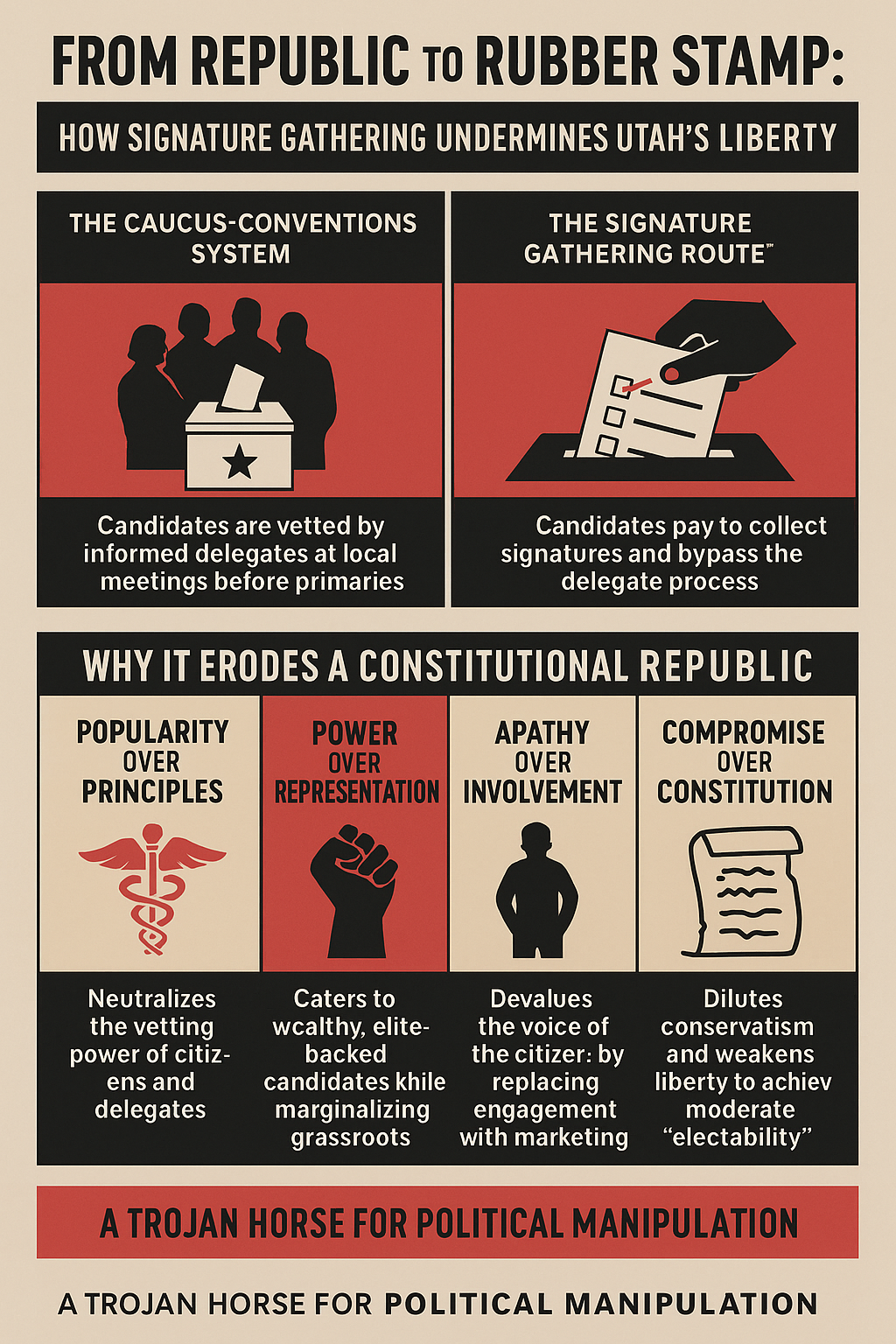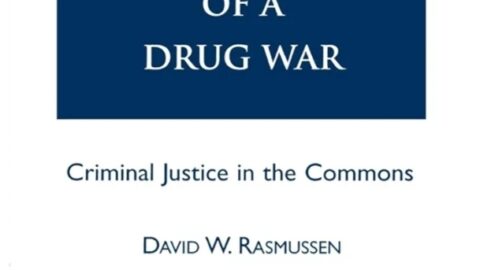Introduction: A Trojan Horse in Republican Clothing
The caucus-convention system in Utah has long served as a grassroots mechanism for vetting political candidates through local, informed, and principled engagement. It was designed to embody the ideals of a constitutional republic—representation through delegates, not direct democracy or media-driven popularity contests.
But with the introduction and entrenchment of the signature-gathering pathway, what began as a so-called reform has steadily eroded the original purpose and power of the caucus system, enabling elite-controlled outcomes and weakening citizen influence.
This article explores how, why, and with what consequences this shift has occurred—on the individual, family, societal, generational, and state levels.
I. The Foundational Role of the Caucus System in a Republic
A. What It Was Meant to Do
- Empower local citizens to vet candidates through face-to-face engagement and policy-driven discourse.
- Select delegates who represent their communities, not donors or media interests.
- Protect against mob rule, celebrity politics, and corporate manipulation—hallmarks of unchecked democracy, not a republic.
“A republic, if you can keep it.” – Benjamin Franklin
The caucus was part of Utah’s attempt to keep it.
II. The Rise of Signature Gathering: A Parallel Track to Power
What Is It?
- A law passed (SB54 in 2014) allows candidates to bypass the caucus system by collecting a required number of signatures to get on the primary ballot.
How It Works:
- Wealthy candidates or well-funded campaigns pay canvassers to gather signatures from the public.
- This circumvents local vetting and enables candidates to appear on ballots without defending their record or ideas before delegates.
III. How This Destroys Republican Principles
1. It Replaces Informed Delegation with Uninformed Democracy
- Signature gathering appeals to name recognition, not principle.
- Instead of being vetted by politically aware citizens, candidates can campaign through ads and slogans—manipulating emotion, not reason.
2. It Privileges Money Over Merit
- Only well-funded candidates can afford mass signature efforts.
- This creates a pay-to-play system, where those backed by PACs or corporate donors dominate.
3. It Silences Grassroots Voices
- Local caucus-goers and precinct leaders lose influence in candidate selection.
- This leads to top-down politics, where national or gubernatorial endorsements carry more weight than citizen input.
4. It Erodes Accountability
- Candidates who bypass the caucus avoid tough questions and minimize direct engagement with informed voters.
- Once elected, they are less tethered to the will of the people and more beholden to special interests.
IV. Why It Was Introduced (and the Hidden Motives)
The Public Reason:
- Proponents claimed it would “modernize the system,” increase voter choice, and prevent delegate “gatekeeping.”
The Real Result:
- Dilution of principled conservatism.
- Increased RINO (Republican In Name Only) success.
- Shift from constitutional fidelity to political marketing.
This was not reform. It was restructuring who controls power in Utah—from the citizenry to the consultant class.
V. Consequences Across Society
Individual
- Voters are less informed, relying on surface-level advertising or party labels.
- Political apathy grows as people feel their voice doesn’t matter—because increasingly, it doesn’t.
Family
- Civic discussions in families are replaced with cynicism or avoidance.
- Children grow up believing politics is about popularity, not principle.
Generations
- Utah’s unique culture of constitutional education and civic responsibility is fading.
- The legacy of grassroots engagement is replaced by digital influence and corporate control.
Society
- True conservatism becomes watered down by moderates who appeal to centrist media and donors.
- Moral clarity is sacrificed for electability.
State and National Impact
- Utah shifts from being a constitutionally principled model to a moderate swing-state lite.
- The Republican Party becomes indistinguishable from its opposition, leading to political disillusionment and generational disengagement.
VI. The Road Back: Restoring Republicanism in Utah
1. Repeal SB54 and Reinforce the Caucus
- Return to delegate-centered selection processes.
- Require candidates to earn trust, not just signatures.
2. Educate the Citizenry
- Teach why a republic differs from a democracy.
- Promote local civic engagement and train delegates in constitutional principles.
3. Encourage Principle over Popularity
- Support candidates who prioritize moral courage over media-friendly compromise.
- Value truth-telling over electability.
4. Hold Politicians Accountable
- Expose those who support the signature route as favoring power over principle.
- Demand public debates and full disclosure of campaign funding sources.
Conclusion: The Price of Convenience is Liberty
Signature gathering may appear democratic, but it undermines the deliberate, local, principled process that undergirds a constitutional republic.
If we abandon process for popularity, we will get leaders who serve themselves, not the people.
Utah’s future depends on remembering that a republic is not just about voting—it’s about informed self-governance. And restoring the caucus is a crucial step in preserving that freedom.






